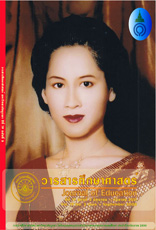การพัฒนาหลักสูตรเสริมด้านทักษะการคิดอย่างมีวิจารณญาณ สำหรับนักเรียนชั้นประถมศึกษาปีที่ 6 ในสถานศึกษาขั้นพื้นฐาน
คำสำคัญ:
การพัฒนาหลักสูตร, หลักสูตรเสริม, ทักษะการคิดอย่างมีวิจารณญาณ, Curricular development, Extra Curriculum, Critical thinking Skillsบทคัดย่อ
บทคัดย่อ
การศึกษาวิจัยครั้งนี้มีวัตถุประสงค์เพื่อพัฒนาหลักสูตรเสริมทักษะการคิดอย่างมีวิจารณญาณสำหรับนักเรียนชั้นประถมศึกษาปีที่ 6 ในสถานศึกษาขั้นพื้นฐาน โดยมีองค์ประกอบของทักษะ 5 ด้าน ได้แก่ ปัญหา ข้อมูล การตั้งสมมติฐาน การสรุปผล และการประเมิน กลุ่มตัวอย่าง คือ นักเรียนชั้นประถมศึกษา ปีที่ 6 ของโรงเรียนบ้านท่าหลวง ซึ่งเป็นกลุ่มทดลองและโรงเรียนบ้านดอนเขว้า เป็นกลุ่มควบคุม ที่กำลังเรียนในปีการศึกษา 2550 ห้องเรียนละ 26 คน ทั้ง 2 โรงเรียนสังกัดสำนักงานเขตพื้นที่การศึกษา นครราชสีมา เขต 7 ดำเนินการในลักษณะการวิจัยเชิงทดลอง 4 ขั้นตอน ประกอบด้วย 1) การศึกษา ข้อมูลพื้นฐาน 2) การสร้างหลักสูตรเสริม 3) การทดลองใช้หลักสูตรเสริม 4) การประเมินการใช้หลักสูตรเสริม เครื่องมือที่ใช้ในการเก็บรวบรวมข้อมูล ได้แก่ แบบทดสอบ แบบประเมิน พฤติกรรมและแบบสัมภาษณ์ สถิติที่ใช้ในการวิเคราะห์ คือ ค่าร้อยละ ค่าเฉลี่ย ค่าส่วนเบี่ยงเบนมาตรฐาน และค่าสถิติที่ใช้ทดสอบ t - test ผลการศึกษาสรุปได้ดังนี้
1. การทดสอบก่อน – หลังการสอน พบว่า ทักษะการคิดของกลุ่มทดลองหลังการสอนสูงกว่าก่อนการสอนและแตกต่างอย่างมีนัยสำคัญทางสถิติที่ระดับ .05 ส่วนกลุ่มควบคุมมีทักษะการคิดหลังการสอนสูงกว่าก่อนการสอนและไม่แตกต่างอย่างมีนัยสำคัญทางสถิติ
2. เมื่อพิจารณาเป็นรายด้านของทักษะการคิดอย่างมีวิจารณญาณ พบว่าค่าเฉลี่ยสูงที่สุด คือการประเมิน รองลงมา ได้แก่ การตั้งสมมติฐาน ปัญหา ข้อมูลและการสรุปผล
3. ผลการประเมินการใช้หลักสูตรเสริมตามเกณฑ์ E1 / E2 (80/80) พบว่าได้ตามเกณฑ์เท่ากับ 81.94 / 81.08
4. ผู้บริหารและครูผู้สอนมีความคิดเห็นว่าหลักสูตรเสริมมีความเหมาะสมในการจัดการเรียนรู้ของนักเรียนชั้นประถมศึกษาปีที่ 6 ในสถานศึกษาขั้นพื้นฐาน
Abstract
The purpose of this study was to develop the enrichment curriculum on critical thinking skills for Pratomsuksa 6 students of basic education schools. The critical thinking skills had 5 compositions : problem, information, hypothesis, evaluation and conclusion. Samples were 26 students of Ban Thaluang. School in the experimental group and 26 students of Ban Don Khawow School in designed as the control group, who performed their between the academic year of 2007 and these schools are under the Office of Nakhon Ratchasima 7. This study was experimental research by design 4 processes of curriculum development were : 1) studying primary sources 2) forming the enrichment curriculum 3) experimenting the enrichment curriculum 4) evaluating the enrichment curriculum. The research tools were tests, evaluated and interview. The data was Analyzed by the use of mean, percentage, standard deviation and compared by t – test. The following results were revealed :
1. The experimental group and the control group were pretested – posttested. The results reveal that posttested scores of the experimental group was statistical significantly higher than the control group after being taught. When consider in each aspect of critical thinking
2. The critical thinking skills were found that students earned the highest score on evaluation skills follwed by hypothesis, problem, information and conclusion.
3. Evaluating the enrichment curriculum. The purpose of stage was to evaluate the effectiveness of the enrichment curriculum by using standard criteria of E1 / E2 (80/80) equals 81.94 / 81.08.
4. Administrator and teacher had interviewed to the enrichment curriculum, which it was suitable.
ดาวน์โหลด
เผยแพร่แล้ว
รูปแบบการอ้างอิง
ฉบับ
ประเภทบทความ
สัญญาอนุญาต
ลิขสิทธิ์ของบทความที่ปรากฏในวารสารศึกษาศาสตร์ มหาวิทยาลัยบูรพา เป็นของวารสารศึกษาศาสตร์ มหาวิทยาลัยบูรพา ทั้งนี้บทความทุกเรื่องผ่านการตรวจสอบความถูกต้องทางวิชาการจากผู้ทรงคุณวุฒิ ข้อความและข้อมูลของบทความในวารสารฯ เป็นแนวคิดของผู้แต่ง มิใช่เป็นความคิดเห็นของกองบรรณาธิการ และมิใช่ความรับผิดชอบของคณะศึกษาศาสตร์ มหาวิทยาลัยบูรพา ไม่สงวนลิขสิทธิ์การนำไปใช้ประโยชน์ทางวิชาการแต่ต้องอ้างอิงแสดงแหล่งที่มาและอยู่ในขอบเขตของกฎหมายลิขสิทธิ์



